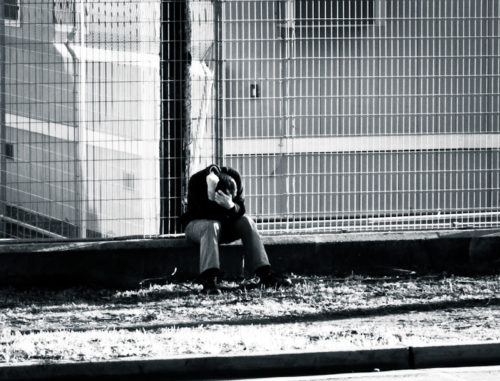Effective Sex Addiction Treatment for Men
Christian Counselor Spokane
Sex addiction is real. In a society that is sexualized in more than a thousand ways, men who suffer from sex addiction are lost in their preoccupying thoughts, ritualized behaviors, shame, and guilt, returning to the same cycle again and again. Men who experience this silent suffering attempt to hide their behaviors and in doing so, they hide themselves from everyone who matters to them, including their partners, friends, children, and themselves. They are disconnected from their spirituality. Though outwardly they may have the look of perfection, inwardly, they fear that they will be found out for their inability to control their thoughts and actions.
“A sex addict is also emotionally anorexic – they must be in order to continue participating in isolated behavior such as being addicted to pornography and being promiscuous or having multiple affairs. All of these secretive behavior patterns affect a family and home.”
― Christopher Dines, The Kindness Habit: Transforming our Relationship to Addictive Behaviors
What Happens During Sex Addiction Treatment?
For sex addiction treatment to be effective, assessment is very important. Assessment is typically performed by a therapist trained in treating sexual addictions, intimacy disorders, and multiple addictions. For treatment to be supportive for men, a complete sexual history taking is important, as is a detailed trauma assessment. Without adequate support from a trained therapist, you may be undertreated and not actually get healthier, but rather just better at hiding your thinking and behaviors.
 Initially, your therapist will get to know you as a person. They will want to hear what you would like to address in your behaviors that are problematic for you, or for your partner. If you want to be seen by a therapist with your partner initially, it will help the therapist to get your partner’s perspective on what they have experienced.
Initially, your therapist will get to know you as a person. They will want to hear what you would like to address in your behaviors that are problematic for you, or for your partner. If you want to be seen by a therapist with your partner initially, it will help the therapist to get your partner’s perspective on what they have experienced.
After listening to your story, doing a thorough assessment, and listening to your partner (if you are in a committed relationship), your therapist will provide some initial thoughts if they believe you are sexually addicted.
Sometimes, when there are significant factors that are influencing your ability to keep yourself safe, your therapist may recommend that you consider residential treatment. If that is suggested, it is because your therapist feels you would benefit from the kind of support you can receive in that setting. If you agree to that recommendation, your therapist will assist you in deciding which program best suits you and the presenting complaints.
Your therapist will offer you a course of treatment that will typically include the following:
- Individual therapy: Where you can work through a structured, task-focused resource that will allow you to define what you don’t want to keep doing, what your boundaries are in recognizing your cycle, and the healthy relationships and sexuality that you desire in your life.
- 12-step group: Where you can join others who are working towards the same goals you are, sexual sobriety, making amends, and helping others who are on a similar journey.
- Therapy groups: Where you can join others who are engaged in individual counseling and benefit from additional help to implement the tasks of recovery.
 For sexual addiction treatment to be effective, all addictions must be addressed. The “Whack a Mole” game is a very real analogy in treating addictive processes. This game is where a participant gets to knock the mole down with a small, soft hammer, only to see another mole appear somewhere else on the game board. As time goes on, the participant is unable to keep up with hitting down the appearing moles, and eventually loses the game. When one addiction is addressed, especially one that is as significant as a sexual addiction, it is imperative that all addictions are addressed. The risk is to not treat the latest addiction that takes over when the sexual addiction is addressed.
For sexual addiction treatment to be effective, all addictions must be addressed. The “Whack a Mole” game is a very real analogy in treating addictive processes. This game is where a participant gets to knock the mole down with a small, soft hammer, only to see another mole appear somewhere else on the game board. As time goes on, the participant is unable to keep up with hitting down the appearing moles, and eventually loses the game. When one addiction is addressed, especially one that is as significant as a sexual addiction, it is imperative that all addictions are addressed. The risk is to not treat the latest addiction that takes over when the sexual addiction is addressed.
What Changes Can I Expect from Sex Addiction Treatment?
When men start getting better in their treatment, they notice a number of changes. Here are a few that are self-reported over time in treatment and support:
- They experience less anxiety.
- They experience less depression.
- They experience an ability to be present with their partners and their families.
- They experience a reduction in shame.
- They experience a move from numbness towards feeling.
- They experience an ability to express a wider range of emotions.
- They experience an ability to identify what their real needs are.
- They experience an ability to share more of themselves with significant people in their lives.
- They experience decreased isolation.
- They begin to define and implement ways to take care of themselves.
- They begin to embrace healthy sexuality.
- They begin to know that sex works best when there is healthy bonding.
For sex addiction treatment to be effective, men will engage in individual therapy between 12 months and 2 years in length through varying levels of support. They will also engage in a therapy group for 12 to 24 months, and be involved in a 12-step “S” fellowship in an ongoing relationship.
Men who are recovering from sexual addiction need to create a community of supportive people over time who will be honest with them. They can be:
- A therapist
- A treatment group or therapeutic community
- A sponsor
- A trusted family member
- A trusted pastor
- Friends
- Fellow 12-step group members
- Fellow sex addicts
- And if we are in a relationship, our partner.
What is Sexual Sobriety and How Can I Achieve it?
Sexual sobriety is important for you to implement if you are sexually addicted. That typically means that when you begin treatment, you will be encouraged to verbalize and write the ways that you have disconnected from your sexuality to engage in compulsive thinking and acting out. It is important to not only list those behaviors that have been regularly occurring, but those that are part of your history as well. For instance, if you communicate to your therapist that you have been compulsively viewing pornography and you want to begin sexual sobriety from that behavior, also include the behaviors that have been present in the past.
 Each time you list a specific, concrete behavior that you want to abstain from, it is important to communicate that to your therapist and your group as well so they know what you are trying to accomplish. It is also important to discuss removing any of your “inner circle” behaviors with your therapist and with your group prior to taking them out of your abstinence list.
Each time you list a specific, concrete behavior that you want to abstain from, it is important to communicate that to your therapist and your group as well so they know what you are trying to accomplish. It is also important to discuss removing any of your “inner circle” behaviors with your therapist and with your group prior to taking them out of your abstinence list.
Abstinence Contract
For a lot of recovering people, it is important to sign an abstinence contract with your therapist that identifies how you will let your therapist and/or close relationships in your life know if you returned to previous use of sexual behaviors. This is helpful to complete and be able to reflect your progress as you engage in treatment for sexual addiction.
Support in the First 90 Days
You may have been engaging in specific behaviors for years and it will be difficult for you to maintain sexual sobriety. You may need the support of a number of people to not only achieve sobriety, but to also maintain it. In treatment, we ask clients to engage in 90 days of abstinence as part of their treatment. The process to stop these compulsive behaviors may include a time of increased cravings, increased anxiety, depression, and irritability which mimics other forms of withdrawal symptoms. Not all people experience these symptoms, but be aware that they can also add to your changing brain’s instability as you seek further healing.
Sexual sobriety is not about “white-knuckling” a period of 90 days. Abstinence from using the behavior(s) and/or drugs are a first step to seek additional help for you and your recovery. Sexual sobriety is not the only goal of any sex addiction treatment focus. It is vitally important to define the behaviors that you wish to eliminate, as well as develop boundaries for concrete behaviors which, if you cross them, will increase the likelihood of returning to previous acting out behaviors.
Boundaries are the “fence before the rock starts rolling down the hill,” where an individual is able to recognize and reach out for help when they are crossing a boundary. Sometimes sexual sobriety is difficult to obtain in early recovery.
Some reasons for this difficulty are:
- frequent triggers from previous behaviors
- unspoken shame
- hidden “stashes” of sexually arousing pictures or objects
- lack of adequate support for your sexual sobriety
As you progress in your early recovery, getting to 90 days is a celebration between you and your therapist, and your group as well. It is also an invitation to enter into sobriety. Living in sobriety begins at Day 91. As difficult as abstinence is for a lot of sex addicts, living in sobriety is even more challenging. Sexual sobriety in this way, is a way to begin living in order to truly get your needs met.
Just as important as defining your abstinence circle and concretely defining your boundaries are your statements and goals of what you are moving towards in healthy sexuality. This is reflected early on in treatment by completing a list of 5 to 10 goals that you will embrace. This is part of your recovery to determine not only goals you have, but resources that you may need to achieve a positive sexual focus in your life and relationships. This is one of many difficult tasks for someone who has been compulsively using sex as a means to find love, or to cover shame. It is in many ways the central task of recovery from sexual addiction, to move from isolation to being known. It is from believing that you are able to choose connection over the disconnection you have chosen in the past.
 You are able to find healthy means and support you need to be more whole in spirit, mind, and body in your recovery from sexual addiction. You will experience being vulnerable and safe as you begin to trust yourself through living a sober life and you will find yourself increasingly free of previous patterns of thoughts and actions.
You are able to find healthy means and support you need to be more whole in spirit, mind, and body in your recovery from sexual addiction. You will experience being vulnerable and safe as you begin to trust yourself through living a sober life and you will find yourself increasingly free of previous patterns of thoughts and actions.
Support Beyond 90 Days
As you engage in consistent, accountable relationships, regular contact with recovering individuals is healthy and provides a safe place to continue to process the many parts of continued sobriety, relationship healing, and nurturing yourself. Being part of a healing community, whether that is in a 12-step group, a church recovery group, and/or a therapy group will allow you the space to be kind to yourself in your healing, as well as continuing your accountability.
Is Lasting Change Possible?
I see change happening every day in the lives of people who were caught up in obsessive, compulsive sexual thinking and acting. Lasting change happens when someone begins to ask for help and knows that real change is about a commitment to taking care of themselves, reaching out regularly for help, and seeking additional support from therapists, pastors, and others in their healing community. Lasting change happens when heart changes happen. That can only happen with intentionality and the individual hard work of pushing back against the process that was set in motion over a number of years. Change is possible because recovering people know that to return to their previous ways of thinking and acting is about disconnection and the endless cycle of addiction.
Recovery is about choosing life, choosing to love and be loved, and choosing to be honest about where you are struggling.
Your healing journey starts with admitting you have a problem. Confronting sexual addiction is hard to do alone or even with a partner who wants to help you. That is why therapists can be so helpful. Therapists in Spokane Christian Counseling are trained to help you put things in perspective.
“Man at Beach,” courtesy of Craig Cloutler, Flickr CreativeCommons (CC BY-SA 2.0); “Handsome Guy,” courtesy of Andy, CC0 Public Domain, ABSFreePic.com; “Thinking,” courtesy of Jacob Botter, Flickr CreativeCommons (CC BY 2.0); “Valentine’s Day,” courtesy of Charles Nadeau, Flickr CreativeCommons (CC BY 2.0)





